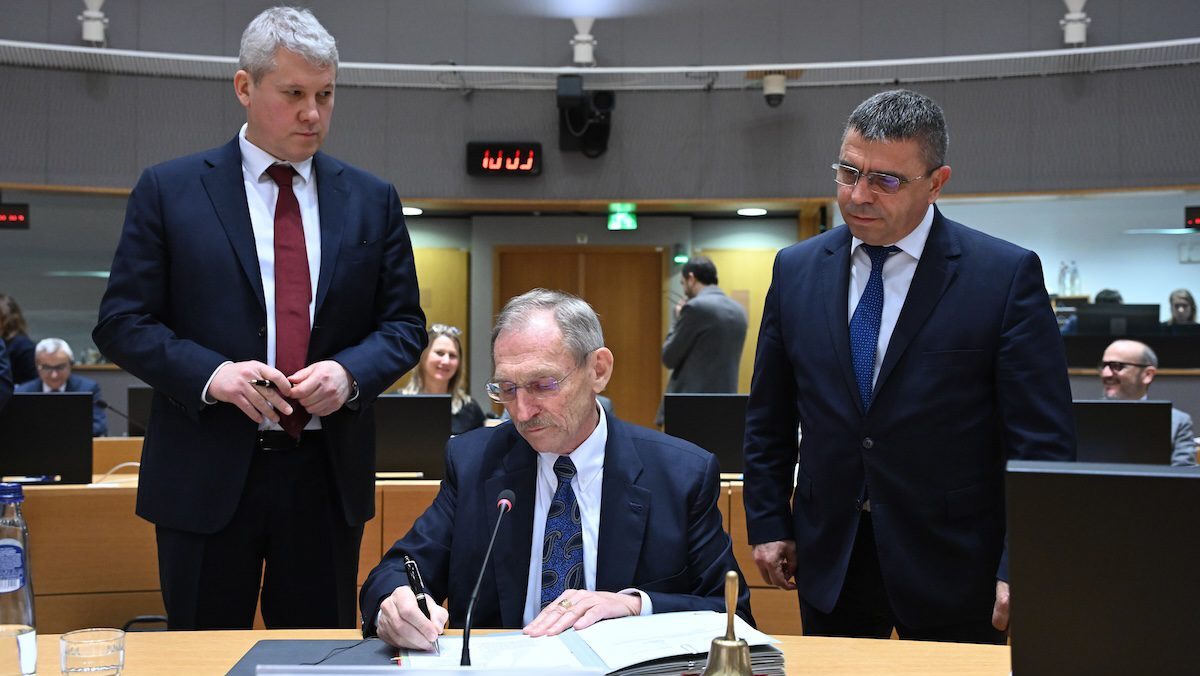
Signing ceremony in the Council after approving Schengen enlargement. Left to right: interior ministers Marian-Cătălin Predoiu (Romania), Sándor Pintér (Hungary), Atanas Ilkov (Bulgaria).
Photo: European Union / Council of the EU, 2024
After keeping them waiting for nearly two decades, the EU home affairs ministers granted Romania and Bulgaria access to the Schengen Area starting January 1st, 2025, with a unanimous EU Council decision on Thursday, December 12th.
The vote follows an important meeting organized by the Council’s Hungarian presidency in Budapest at the end of last month where Austria—the most ardent opponent of abolishing two of the last hard borders in Europe due to concerns of illegal migration—agreed to lift its veto at last.
The two countries applied for Schengen membership not long after joining the EU in 2007 and were declared “ready” to join by the European Commission in 2011. The road to accession turned out to be much longer than anticipated and finally happened in large part due to the Hungarian presidency treating the issue as a “top priority” and tirelessly negotiating with the last remaining holdouts, Austria and the Netherlands.
Signed and sealed — dear Bulgarian and Romanian friends, welcome to the Schengen zone! 🥳 pic.twitter.com/QJbCqLcLYx
— Hungarian Presidency of the Council of the EU 2024 (@HU24EU) December 12, 2024
“It’s done. It’s decided. It’s deserved,” EU Parliament President Roberta Metsola celebrated on X. “Congratulations to the people of both countries who have worked hard and long for this.” EU Commission chief Ursula von der Leyen was quick to follow up with a similar message. “Fully in Schengen—where you belong,” she wrote on X.
In a long statement, Romania’s outgoing president Klaus Iohannis praised the decision and expressed his gratitude to all institutions and officials involved in the negotiations. “Today’s decision is a clear confirmation, without any interpretation, of a reality. Romania’s place is in the Schengen area, based on our performance and commitment,” Iohannis wrote.
Romania thanks all EU institutions & member states for their support and trust. Today’s decision is a recognition of our years-long efforts and progress achieved. RO assures that we will continue to act fully responsible for protecting & strengthening EU's external borders.
— Klaus Iohannis (@KlausIohannis) December 12, 2024
While Vienna did recognize that Romania and Bulgaria had achieved great progress in reducing illegal crossings, it still demanded a key concession to be included in the Budapest Declaration which casts a shadow on all these celebrations.
Although the two countries will become full Schengen members from next year as far as EU law goes, the agreement signed by the four countries—Romania, Bulgaria, Austria, and Hungary—provides that they would keep border checks in place for “at least” another six months “to mitigate the potential change of migratory patterns that may arise as an immediate consequence of the absence of internal borders.”
It’s unclear whether these remaining checks would cover the entirety of the borders between Hungary, Romania, and Bulgaria or only certain key crossing points. Moreover, by specifying that hard borders could remain in place for “at least” half a year, the agreement also foresees the potential extension of the measure.
‼️ Read the full text of today’s joint Hungarian-Austrian-Romanian-Bulgarian declaration agreed in Budapest. This milestone sets the stage for the next step: the @EUCouncil decision on the full accession of Bulgaria and Romania to Schengen.#HU24EU
— Hungarian Presidency of the Council of the EU 2024 (@HU24EU) November 22, 2024
🇭🇺🇪🇺 pic.twitter.com/dzpogr3Y67
